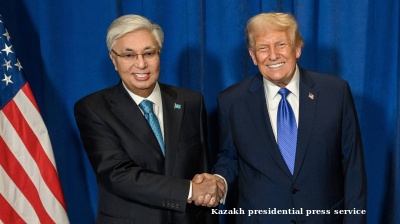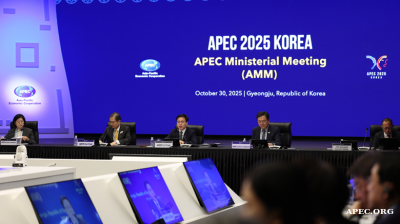For most of the last three decades since winning independence, Central Asia has been a bit of a backwater. Of course it still has the strategic location significance it used to have a century ago when it was the stage for the Great Game between the British and Russian empires, but in reality the backward republics in the middle of nowhere didn’t kindle much interest in Washington.
That has all changed now. With the increasingly intense East-West confrontation and the effort to get emerging markets to choose sides, Central Asia’s position was exactly in the middle between the superpowers as seen foreign leaders flock to the steppes and woo the governments of the five ‘Stans with grants and trade deals.
For their part, the ‘Stans have been cautious, trying to stay neutral and play both sides of the court. As a result, Central Asia has been one of the biggest winners from the confrontation. The showdown and remake of both trade and energy flows has netted the ‘Stans a boost in investment and income. The economies are flourishing and they are now trying to capitalise on their windfall.
None of this is lost on the mercantile Trump administration. Under US President Joe Biden, Washington paid paltry attention to Central Asia. During one of first visits to the region, former US Secretary of State Antony Blinken brought a promise of a mere $45mn programme to encourage the ‘Stans to reorientate their trade away from Russia, with whom they were doing billions of dollars of business and has been the dominant power in the region for decades.
But the remake of the energy markets in particular, and especially the cornucopia of raw materials, oil and gas and rich deposits of rare earth metals (REMs) has been the glitter to catch the magpie-eye of US President Donald Trump, who is pursuing an increasingly obvious minerals diplomacy. To underscore the point, only last week the US signed off on a Kazakh minerals deal with the White House to ensure a US firm gains access to Kazakhstan’s massive reserves of tungsten.
When US lobbyist Samantha Carl-Yoda, Policy Director at Brownstein Hyatt Farber Schreck, describes US energy strategy, she does so with the confidence of someone who has been in the room where decisions are made. A former energy adviser and policy negotiator on several major deals as well as advisor to several US Senators, she says the question she was asked first by the Trump White House on returning to office was simple: “Can you build a Trans-Caspian pipeline?” Her answer was immediate. “Sure. Let’s build a Trans-Caspian pipeline — something I’ve wanted for ten years!”
Washington has suddenly become hot for Central Asia as the appetite for energy engagement in Central Asia is revived. After a decade of relative detachment, the US is again exploring ways to link Caspian producers such as Turkmenistan to global markets — and, crucially, to bring American companies and capital into the mix.
“With this administration, there is a new way of doing business. It’s not like anything that has gone before, Carl-Yoda told bne IntelliNews on the sidelines of the 30th Turkmenistan Oil and Gas Conference and Exhibition (OGT2025) in Ashgabat at the end of October. “He is all about minerals. He is all about “energy dominance.” And he is all about benefiting US companies from big projects going on around the world.”
Energy dominance, redux
For the Trump administration, natural gas is not just a commodity but an instrument of statecraft — one that can generate profits, curb the leverage of rivals and, in her words, “put US companies in a place where they can develop resources, drive economic change, and be profitable.”
In practice that means reviving stalled infrastructure ideas. He kicked off his debut on the geopolitical stage by tying aid to Ukraine with a minerals rare earth metals deal and drove a very hard bargain that was eventually signed on April 30 by the now Ukrainian Prime Minister Yuliia Svyrydenko. Indeed, she got promoted from her position as special envoy to Washington largely on a strength of her ability to hold her own in talks with Trump. Since then, as bne IntelliNews has reported, Trump’s foreign policy has been dominated by his minerals diplomacy; in parallel to the raft of peace accords he claims to have brokered, he has also cut at least seven minerals-related deals in parallel.
Central Asia is all about oil and gas and Turkmenistan is all about gas. The long discussed but never built Trans-Caspian pipeline would connect Turkmenistan’s colossal gas reserves to Azerbaijan and onward to European systems, diversifying supplies away from Russia and Iran, says Carl-Yoda, who worked on that deal.
It is, she concedes, a technically and diplomatically complex project, but one the White House views as strategically useful.
“If you’re going to build a Trans-Caspian pipeline,” she argued, “you want an Exxon or a Chevron to be part of that because it helps to buffer any potential concerns about a line that crosses the Caspian itself. It de-risks the project on a political level.”
The deal with the TAPI pipeline is entirely different, as Turkmenistan has, at its own cost and effort, negotiated the necessary agreements with the Taliban, and just completed the first 14km on Afghan soil. The first section, which XX dubbed “phase zero”, connecting Serhetabat in Turkmenistan to Herat in Afghanistan, should be completed by the end of next year. The state-owned natural gas operator Turkmengaz told bne IntelliNews in Ashgabat that all the pipes have already been procured and construction is underway. The pipeline is due to be loaded with gas sometime between the end of 2026 and the first quarter of 2027.
Eventually the TAPI (Turkmenistan-Afghanistan-Pakistan-India) pipeline is an 1,800-kilometre corridor designed to ship 33bn cubic metres of gas annually from the massive Galkynysh field, which holds 27.4 trillion cubic meters of the country’s proven reserves – more than half the of the total proven reserves -- to energy-hungry South Asia.
Commencing work on the Serhetabat-Herat section of the pipe is a huge coup as the Taliban have proven themselves to be nothing if not a difficult business partner to work with. However, after several years in charge, the unacknowledged government in Kabul is softening to the entreaties of the patient diplomacy put in by their neighbours who are keen to uncork the southern routes out of Central Asia. The slowly warming relations were highlighted by Moscow’s decision in April to drop the Taliban’s “terrorist organisation” designation, a decision that both Kazakhstan and Kyrgyzstan already made in 2023, following the US departure from the country in 2021.
“If I’m President Trump,” Carl-Yoda said, “I’m looking at Afghanistan and saying: I’ll give you the ability to build this pipeline, but whatever government you have, I want to talk about your minerals. President Trump is all about making a deal.”
A famous US Pentagon report claimed in 2010 that Afghanistan has $1 trillion worth of untapped mineral deposits. Experts have since poured scorn on that report, which is based on the extensive 1970s Soviet-era minerals survey of the whole of the USSR that many of the 15 now independent republics (including Ukraine) still refer to, but nevertheless it is clear that Afghanistan is home to significant amounts of important rare earth metals (REMs) and critical minerals – lithium in particular.
Carl-Yoda says that the US is in a strong position in any negotiations with the Taliban over its mineral rights and that infrastructure can serve as leverage: the carrot of investment tied to the stick of governance conditions.
It appears that the first round of vying for Afghanistan’s richest has already begun. China has also been actively negotiating with the Taliban for mineral deposits rights to improve its already almost total monopoly over the production of rare earth metals. In July, Trump announced that he wanted back control of the Bagram Air Base, just outside Kabul. What looks like a slightly bizarre demand at first glance, makes more sense once you realise the base is now being operated by Beijing and provides the essential logistical support for any large-scale mining operations that might start in Afghanistan. Even if a US company did win a mining contract in Afghanistan, it would have no way to get its miners or machines into the country without access to Bagram.
LNG and pipelines
In Turkmenistan the issue is almost exclusively focused on gas – and piped gas at that, not LNG.
Turkmenistan has a similar geological profile to its neighbours and is also home to commercially viable deposits of many raw materials – potash, gold, copper and barite among other things – none of this has been developed as the country with officially only 7mn people (the true number may be closer to 3mn) makes so much money from gas that it doesn’t need to do anything else; gas accounts for some 80%-90% of the government’s revenues.
The predominance of gas in Turkmenistan’s business should suggest that it’s in competition with Trump’s drive to massively expand America’s LNG exports, but Carl-Yoda argues that not the case. While the US has been ramping up LNG production, it is still facing significant logistic restrictions on getting that to market that won’t be solved for many years. The catchment area Turkmenistan serves via its piped gas in SE Asia is still probably better served by piped gas than more expensive US LNG. India and Pakistan, in particular, are extremely price sensitive and piped gas remains significantly cheaper than LNG. Meanwhile, global demand for gas continues to surge. The world’s energy appetite is large enough for both American LNG and Central Asian pipeline gas for now, Carl-Yoda argues.
“Trump is going to push US LNG far and wide,” Carl-Yoda said. “But when the gas is coming out of Turkmenistan, it’s going to a region where only some US LNG goes right now. It’s really far away.”
A world still hungry for gas
Behind this calculation lies a broader forecast. New projects in the US — including Driftwood LNG, now Louisiana LNG under Woodside’s control — keep expanding capacity, but Carl-Yoda believes the administration’s deregulatory drive has “pushed out peak gas by at least another ten years.” Even by 2040 or 2050, she said, demand will remain strong.
Like everyone else, Carl-Yoda points to the data centre explosion that has already sent demand for power soaring and was not visible in 2015 when the Paris Agreements were drawn up which assumed the demand for gas would decline as a result of the switch to renewables. Those models are clearly no longer valid. Delegates at the OGT2025 in Ashgabat were universal in their agreement that electricity demand tied to digital infrastructure will underwrite gas demand for many more decades to come rather than fading away.
The exponential growth of computing power and 24-hour electricity demand, she noted, will increase global gas consumption for power generation: “The data-boom, the AI-boom, means you’re going to need more gas globally.”
A regional and a commercial calculus
For Washington, Carl-Yoda added, the immediate objective is to consolidate relationships with the five Central Asian states, which President Trump is hosting in Washington in November under the “C5 plus 1” format.
The summit offers Turkmenistan a chance to demonstrate its contribution to energy security and “speak the language of dominance” that the White House wants to hear. President Serdar Berdimukhamedov, the son of the former President Gurbanguly Berdimukhamedov, who is now known locally as “Arkadag”, which means “Protector of the Nation,” will have a chance to speak to Trump personally and lobby for support and realign US policy in a region historically shaped by Russian and Chinese interests.
For Trump’s part, he will push for American participation in projects such as TAPI or a Trans-Caspian link that will provide political ballast to the meeting as well as commercial opportunity. Trump’s message to Turkmenistan is: work with US firms, attract private capital, and gain both technology and geopolitical cover, or face the consequences if you go over to the Beijing-Moscow alliance.
A quid pro quo is predictable, says Carl-Yoda. Washington wants assurances of transparency, open tenders and fiscal terms attractive to international investors. It also wants projects that showcase Western engineering standards and reinforce global supply resilience. Turkmenistan could become a useful base of operations in the Central Asian region. In an era of energy weaponisation, a new pipe across the Caspian would be a visible symbol of pluralism in trade routes and a US-backed counter to the Chinese-backed Middle Corridor.
Gas, politics and the next decade
Carl-Yoda’s assessment is pragmatic rather than ideological. The US, she argued, will continue to champion LNG exports, but it recognises that overland pipelines remain critical to energy security in Asia. Far from competing, these channels reinforce one another — geographically segmented, commercially distinct, yet serving the same political end: reducing single-supplier dependence and sustaining global demand for natural gas.
That tallies closely with the major theme of OGT2025, the Turkmen government and most of the delegates at OGT2025: diversification and sustainability are the keys to making the gas business work in the new economic paradigm that is emerging in Trump’s increasingly transactional world.
Carl-Yoda’s closing view could serve as the summary of the entire conference in Ashgabat: the world’s need for gas has not peaked and the global energy markets are being fundamentally remade. “The conversation that will happen in November [in Washington] will be an opportunity for the government of Turkmenistan to advance its own objectives and demonstrate what it is doing vis-à-vis energy security,” Carl-Yoda says.
For Turkmenistan, that means new partners, new capital, new export routes, and a new relationship with Washington.
Features

BOTAŞ and Turkey’s hub ambition: from “30-year dream” to cross-border reality
For Ankara, the symbolism is as important as the molecules: Turkey’s energy map is shifting from end-market to hub.

Indian bank deposits to grow steadily in FY26 amid liquidity boost
Deposit growth at Indian banks is projected to remain adequate in FY2025-26, supported by an improved liquidity environment and regulatory measures that are expected to sustain credit expansion of 11–12%

What Central Asia wants out of the upcoming Washington summit
Clarity on critical minerals and a lot else.


